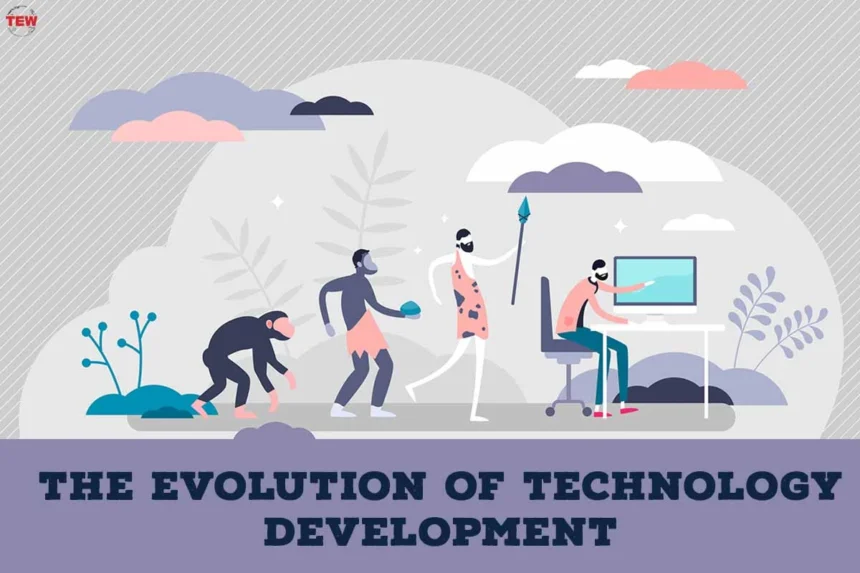Image Source: theenterpriseworld
An omnipresent facet of our lives, has undergone significant transformations throughout history. This article delves into the evolution of technology, from the inception of rudimentary tools to the upcoming technological revolutions, while also speculating on future trends.
Prehistoric Innovations: Human Ingenuity at Its Dawn
Human beings, unique in their capacity to innovate, have been technologists since the inception of their existence. The urge to transcend natural limitations led early humans to devise rudimentary techniques to manipulate their surroundings. The control of fire, the creation of simple tools, and the invention of the wheel were all crucial turning points in our technological journey.
The Industrial Revolution: The Dawn of Mechanization
Spanning from the late 18th to the mid-19th century, the Industrial Revolution was a pivotal period in human history. It marked a significant shift from agrarian economies to industrialized societies. The invention of machines, such as the steam engine and power loom, revolutionized manufacturing processes and exponentially increased productivity.
The advent of the steam engine, developed by James Watt, played a vital role in powering factories, ships, and railways. This breakthrough in energy production fueled the mass production of goods and led to the rapid growth of industries. The power loom, invented by Edmund Cartwright, mechanized the textile industry, transforming it from a labor-intensive craft to a mechanized process.
The Industrial Revolution not only transformed manufacturing but also had a profound impact on transportation. The invention of the steam-powered locomotive by George Stephenson paved the way for the development of railways, enabling faster and more efficient transportation of goods and people.
The Age of Electricity and Telecommunications
The late 19th and early 20th centuries witnessed another major technological breakthrough – the harnessing of electricity. The development of electric power systems facilitated the widespread adoption of electric lighting, revolutionizing homes and cities. Thomas Edison’s invention of the practical incandescent light bulb and Nikola Tesla’s contributions to alternating current (AC) power transmission were instrumental in the electrification of the world.
Alongside the advancements in electricity, the field of telecommunications also experienced rapid growth. The invention of the telegraph by Samuel Morse revolutionized long-distance communication. The telegraph enabled messages to be transmitted across vast distances using Morse code, significantly reducing the time it took to communicate.
The 20th Century: A Technological Renaissance
The 20th century witnessed an explosion of technological advancements across various domains. The proliferation of automobiles, airplanes, and radio transformed transportation and communication. The development of the assembly line by Henry Ford revolutionized manufacturing, making cars more affordable and accessible to the masses.
The invention of the telephone by Alexander Graham Bell further revolutionized communication. It brought people closer together, allowing for real-time conversations over long distances. The telephone laid the foundation for future advancements in telecommunications, including the internet and mobile phones.
The Digital Age and the Internet Revolution
The late 20th century gave birth to the digital age, characterized by the rapid advancement of computer technology. The invention of the microprocessor, integrated circuits, and personal computers laid the groundwork for a digital revolution. The rise of companies like Microsoft, Apple, and IBM propelled the personal computer into the mainstream, making computing accessible to the masses.
However, the most significant technological advancement of the digital age was the creation of the internet. The internet connected the world like never before, enabling the exchange of information, communication, and commerce on a global scale. The World Wide Web, developed by Tim Berners-Lee, revolutionized the way we access and share information, leading to the rise of e-commerce, social media, and online services.
Future Technological Frontiers
As we enter the 21st century, technology continues to evolve at an unprecedented pace. Some of the emerging technological frontiers include:
- Artificial Intelligence (AI): AI has the potential to revolutionize various industries, including healthcare, transportation, and finance. From autonomous vehicles to personalized medicine, AI is poised to transform the way we live and work.
- Internet of Things (IoT): The IoT refers to the network of interconnected devices that can communicate and share data with each other. This technology has the potential to enhance efficiency and convenience in our daily lives, from smart homes to connected cities.
- Renewable Energy: With growing concerns about climate change, the development of renewable energy technologies has become crucial. Solar power, wind energy, and other sustainable energy sources are expected to play a significant role in shaping our future.
- Virtual Reality (VR) and Augmented Reality (AR): VR and AR technologies have the potential to revolutionize entertainment, education, and various industries. From immersive gaming experiences to virtual training simulations, these technologies offer new ways to interact with the digital world.
- Biotechnology: Advances in biotechnology hold the promise of revolutionizing healthcare, agriculture, and environmental sustainability. From gene editing to synthetic biology, these technologies have the potential to address pressing global challenges.


